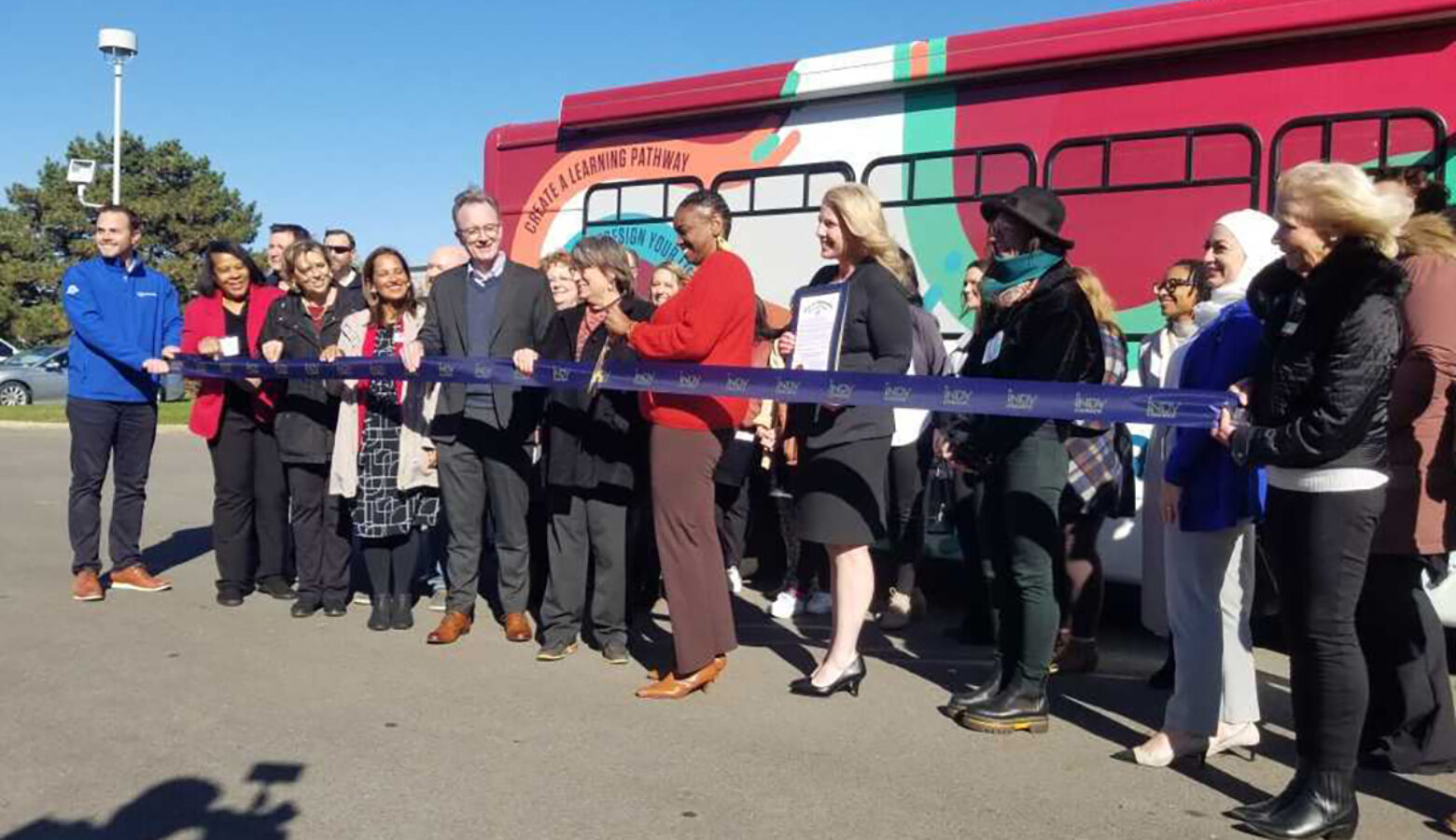New mobile career lab brings resources to underserved communities

A new mobile career lab unveiled by Indiana Wesleyan University aims to offer career advising and resources to people in underserved communities. University staff said the goal is to reduce barriers that prevent Hoosiers from pursuing new career paths.
A colorful, miniature school bus labeled “mobile career lab” sat parked outside IWU’s Indianapolis campus Thursday morning. Staff members and community partners stood in front of the bus, holding a long purple ribbon. In the middle of the crowd, the university’s director of career labs, Carla Biro, held up a large pair of scissors.
With a quick snip, Biro cut the ribbon.
Biro said the mobile career lab meets people where they are, literally and figuratively. The goal is to help people who feel limited by their individual situations look at the options that are available to them.
“Folks in the community aren’t sure how to ask the questions. Not sure exactly where to go, how to take that first step,” she said. “And we understand, we know the importance of higher education. So we’ve tried to figure out what is the mechanism we can utilize to take this, of course, to them rather than waiting for them to come to us.”
Eileen Hulme, Indiana Wesleyan national and global chancellor, said mobile career labs are still a fairly new concept created to fill a need.
“Our regional centers are all in these business parks. But the people that we really want to reach, that we really want to be about, aren’t in these business parks,” she said. “How do we go to the people that really need to hear about education or at least need to understand what the pathways are, what the options are? We came up with this crazy idea of, let’s get a van and go to them. So that’s where the idea originated. And a year and a half later, we’re on the road.”
Karen Dowling, Indiana Wesleyan’s vice president for diversity and intercultural integration, said the mobile career lab has been a long-time goal the university is happy to have finally achieved.
“This has been a dream for over two years, and there was a lot of planning about, what if we could go out and mobilize our educational pathways opportunities?” she said. “It doesn’t always have to be a degree. It could be a certificate or just some additional education or some way towards a goal as a means to an end.”
Dowling said a crucial aspect of the mobile career lab is its ability to travel to the people who need it.
“It’s very important to us that we are mobilized and out in our communities, similar to what we want to do with our churches and our classrooms. Be outside of the four walls,” she said. “We want to be where the people are and be in their areas.”
Join the conversation and sign up for the Indiana Two-Way. Text “Indiana” to 73224. Your comments and questions in response to our weekly text help us find the answers you need on statewide issues, including our project Civically, Indiana.
A session at the career lab lasts about 45 minutes to an hour. They typically begin with an assessment to determine career paths an individual is passionate about and able to excel in. After that, individuals can participate in a one-on-one session with a career lab guide. Biro said guides connect people directly to the mobile career lab’s local partners.
Those partners include organizations like Christel House DORS, the Excel Center, Turning Point Recovery Home, Wheeler Mission and employers in a variety of fields.
In addition to career exploration, the mobile career lab also aims to reduce barriers to continuing education and new career paths. Biro said the lab asks questions about food insecurity, housing support, childcare, and other community resources the mobile career lab’s partners can address.
“Not saying that we can alleviate it all, but we want to make sure they know where they can go to find that support that they need,” Biro said.
The mobile career lab’s goal is to reach 150 people in the Indianapolis area in its first year. Biro said there are plans to eventually add more buses to the fleet and expand their coverage across the state.
Indiana Wesleyan Chancellor Eileen Hulme said there is potential to have buses that serve non-English speaking populations and other minority or underrepresented groups.
If the mobile career labs are successful in Indiana, Hulme said there is also potential to expand them in Ohio, Kentucky and other surrounding states.
“We’re not aware of too many other places that are doing it just exactly like this. If it works, then we’re going to try to get van two and then van three and van four,” she said. “We would love to be in all the surrounding states in the Midwest serving them as well.”
Hulme said expansion is challenging because different communities have different needs. She emphasized that the goal first and foremost is to serve people in the best way possible.
“We’re really going to try to listen to the community,” she said. “You know, what is it about this that worked for them, and what didn’t? And then we’re going to shift and make the next one different so that it can actually meet the direct needs of the communities that we’re serving.”
Kirsten is our education reporter. Contact her at [email protected] or follow her on Twitter at @kirsten_adair.

